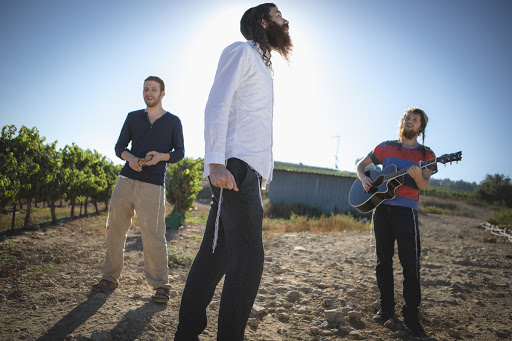Matisyahu – once the sole representative and ambassador of the Hasidic community to the world of popular culture – is now completely shorn and taking a less overtly religious approach to music. Meanwhile, a new group from Brooklyn may be promptly taking his place.
Singer Shlomo Ari Gaisin, peruccionsist Elisha Mlotek, and guitarist Zachariah Goldshmiedt – collectively, “Zusha” – just released an impressive EP produced by Mason Jar Music, the same musical collective that’s been busy collaborating with spiritually-minded minstrel Josh Garrels.
“Zusha was formed in the East Village, by three neo-Hasidic dudes with less passion for college and more passion for music. While borrowing lines from ancient liturgy, Zusha’s music is a blend of jazz, reggae, folk, ska, gypsy swing, and traditional Jewish soul. The resulting sound is dynamic; at times it feels raw and rustic, at times gentle and poignant. And then sometimes you just can’t help but get up and dance. In Hebrew, the name for a wordless melody is ‘Nee-goon’. Zusha songs nurture this concept of the ‘nee-goon’, believing that when songs are unbound by words they can be infinitely personalized and mean different things.”
Matisyahu fans will instantly recognize these “wordless melodies” which filled his earlier albums like Shake off the Dust…Arise. As Goldshmiedt explains in the Huffington Post, as a musical form of praise it’s infused with a contagious and mystical sense of joy, something so often missing from religious music and religious life itself. “People are seemingly down and missing the joy in Judaism and the joy in life,” he notes. “But Hasidic teachings are about being happy, being truthful. We want to reconnect to what it means to be a person, and our music is coming to bring back the raw emotion of what everything is about.”
That raw emotion is palpable throughout the EP, from the whimsical “Peace,” to the introspective “Question,” to my personal favorite, “
.” Gaisin’s wistful chant on this track, complemented by an equally sorrowful brass section, instantly brought to mind Psalm 137 and a feeling of longing amid captivity:By the rivers of Babylon
There we sat weeping
When we remembered Zion.
On the poplars in its midst
We hung up our harps.
For there our captors asked us
For the words of a song;
Our tormentors, for joy:
“Sing for us a song of Zion!”
But how could we sing a song of the Lord
In a foreign land?
Of course, none of this is in the song explicitly – this was just where the song happened to take me as a listener. But that’s the magic of the blank canvas Zusha is working with. In a culture in which “the old words of grace are worn smooth as poker chips,” and religious language lacks the shape and force it once had through use and abuse, they cultivate this more elemental realization of faith through song, conveying its weight and glory from the inside before actually articulating a thing.
The entire EP, thankfully, is not wordless – otherwise, the temptation would be to rip the chants from their context and give them any meaning whatsoever. This clearly is not what Zusha is going for – the canvas may be blank, but it’s also been claimed. “Yisgadal,” for example, takes its lyrics from a Hebrew prayer known as “The Great Kaddish,” which “refers to a world-to-come where the deal will be raised to eternal life” and is traditionally sung during a burial:
Yisgadal v’yiskadash sh’mei rabbaw
B’allmaw dee v’raw chir’usei v’yamlich malchusei
(May His great Name grow exalted and sanctified
In the world that He created as He willed)
Whether with words or without them, Zusha delivers refreshingly believable and open-ended songs of worship. They sing not to a staid watchmaker or fussy rulemaker, but out into the joyful expanse of the eternal Creator, where the line separating our love of music and God’s love for us grows thin.
Where, as Zusha shows us: “Every song is a story. Every tune is a prayer.”
Matthew Becklo is a husband and father-to-be, amateur philosopher, and cultural commentator at Aleteia and Word on Fire. His writing has been featured in First Things, The Dish, and Real Clear Religion.

